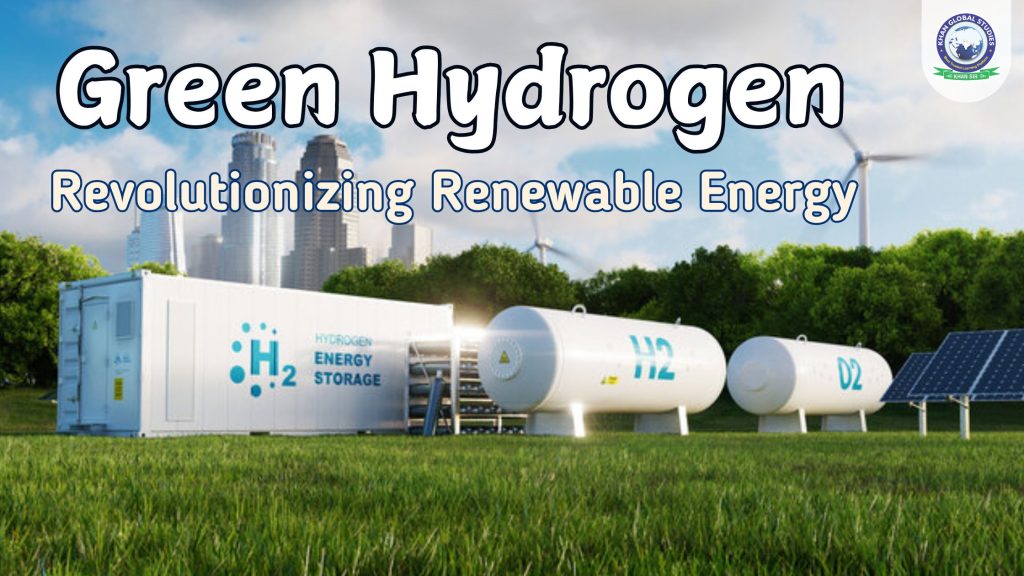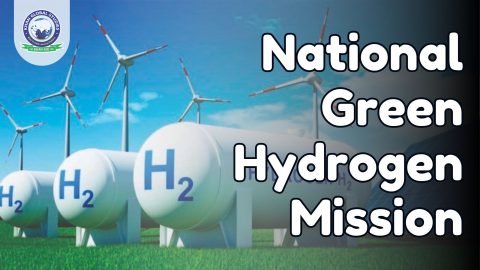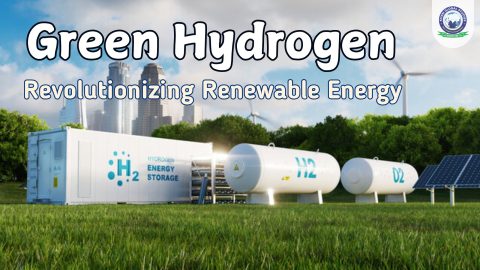Green hydrogen is a clean and sustainable form of hydrogen produced through electrolysis using renewable energy sources such as solar and wind power. Unlike grey and blue hydrogen, which emit greenhouse gases during production, the production of green hydrogen is completely emission-free, making it an essential tool in combating climate change.
Hydrogen, the most abundant element in the universe, rarely exists freely on Earth. Instead, it bonds with other components, requiring processes such as electrolysis to extract it into a usable form.
Types of Hydrogen
Hydrogen production methods classify it into the following types:
- Green Hydrogen:
- Produced using renewable energy such as solar or wind power.
- Zero carbon emissions during production.
- Environmentally sustainable.
- Grey Hydrogen:
- Derived from natural gas or methane.
- Emits significant amounts of CO2 during production.
- Blue Hydrogen:
- This is also derived from natural gas but uses Carbon Capture and Storage (CCS) technology.
- Partially reduces CO2 emissions.
Importance of Green Hydrogen
Green hydrogen is crucial for achieving global climate goals and transitioning to a low-carbon economy. Below are its key benefits:
- Decarbonising the Energy Sector: Green hydrogen serves as a clean alternative to fossil fuels, significantly reducing carbon emissions in industries such as steel, cement and chemicals.
- Energy Storage: It serves as a storage medium for renewable energy, addressing the disruption of solar and wind power.
- Sustainable Transport: Used in hydrogen fuel cells, green hydrogen powers zero-emission vehicles including cars, buses and trains.
- Industrial Applications: Plays a key role in the production of ammonia and methanol and as a feedstock for heavy industries.
- Energy Independence: Helps countries reduce their dependence on imported fossil fuels, thereby increasing energy security.
Green Hydrogen in India
India has taken ambitious steps to become a global leader in green hydrogen production. Some of the notable initiatives include:
- National Green Hydrogen Mission: Launched in 2023 with an investment of ₹19,744 crore, the mission aims to produce 5 million tonnes of green hydrogen annually by 2030. Supports pilot projects, research and development of electrolyser technology.
- Strategic Collaboration: Partnerships with countries such as Germany and Australia promote technical exchange and investment.
- Industry Participation: Major companies such as Adani Group and Reliance Industries invest heavily in green hydrogen infrastructure.
- Policy Framework: The Indian government provides subsidies and incentives for green hydrogen projects to encourage private sector participation.
Challenges in Green Hydrogen Production
Despite its advantages, green hydrogen faces several challenges:
- High Production Cost: Electrolysis is expensive due to the high cost of renewable energy and electrolysers.
- Infrastructure Limitations: Advanced infrastructure such as special pipelines and tanks is required for storage and transportation.
- Water Dependency: Electrolysis requires large amounts of water, raising concerns in water-scarce regions.
- Energy Efficiency: The process of converting electricity into hydrogen and back into energy has a lower efficiency rate than direct electricity use.
- Policy Gaps: Lack of global standardisation and adequate subsidies hinder large-scale adoption.
Measures to Overcome Challenges
Innovation and collaboration are needed to address these challenges:
- Technological Advancement: The development of low-cost electrolysers and high-efficiency catalysts can reduce production costs.
- Public-Private Partnerships (PPP): Collaborative investments between governments and private companies can expand infrastructure and research.
- Water Recycling: Adopting desalination and recycling technologies can reduce water scarcity problems.
- Global Collaboration: International agreements on standardization, technology sharing, and financing can accelerate adoption.
Applications of Green Hydrogen
Green hydrogen’s versatility spans across many sectors:
- Renewable Energy Storage: Stores excess energy generated from solar and wind power for later use.
- Transportation: Powers hydrogen fuel cell vehicles and facilitates the shift towards sustainable mobility.
- Heavy Industry: Decarbonizes processes in industries such as steel production and chemical manufacturing.
- Power Generation: Enables grid stabilization by providing a stable energy supply during peak demand.
Future of Green Hydrogen in India
India’s commitment to green hydrogen is set to transform its energy landscape. Key future developments include:
- Expanding domestic manufacturing of electrolysers to reduce dependence on imports.
- Promoting the use of green hydrogen in public transport systems.
- Establishing export hubs for global trade in green hydrogen.
- India seeks to establish itself as a global green hydrogen hub by integrating renewable energy policies and encouraging innovation.
Frequently Asked Questions (FAQ)
Q: What is green hydrogen?
Answer: Green hydrogen is a carbon-free energy source produced through water electrolysis using renewable energy such as solar or wind power.
Q: Why is green hydrogen important?
Answer: It helps reduce carbon emissions, addresses energy storage challenges, and supports cleaner industrial processes.
Q: How is green hydrogen different from blue hydrogen?
Answer: While both are clean options, green hydrogen uses only renewable energy, while blue hydrogen involves carbon capture but relies on fossil fuels.
Q: What is India’s Green Hydrogen Mission?
Answer: Launched in 2023, the mission aims to make India a leader in green hydrogen production, aiming to produce 5 million tonnes annually by 2030.
Q: Which industries use green hydrogen?
Answer: Industries such as steel, cement, chemicals, and transportation benefit significantly from green hydrogen applications.






